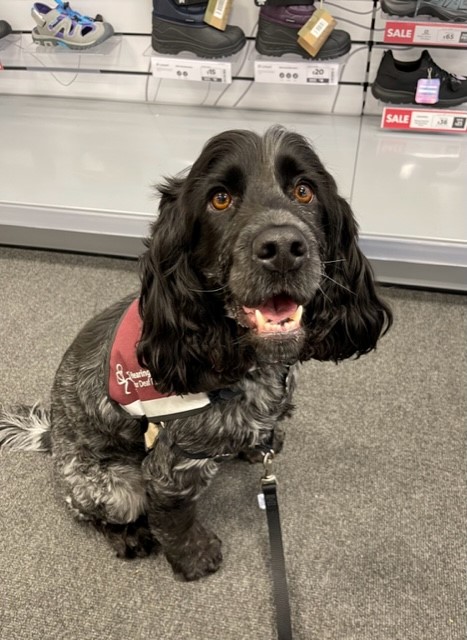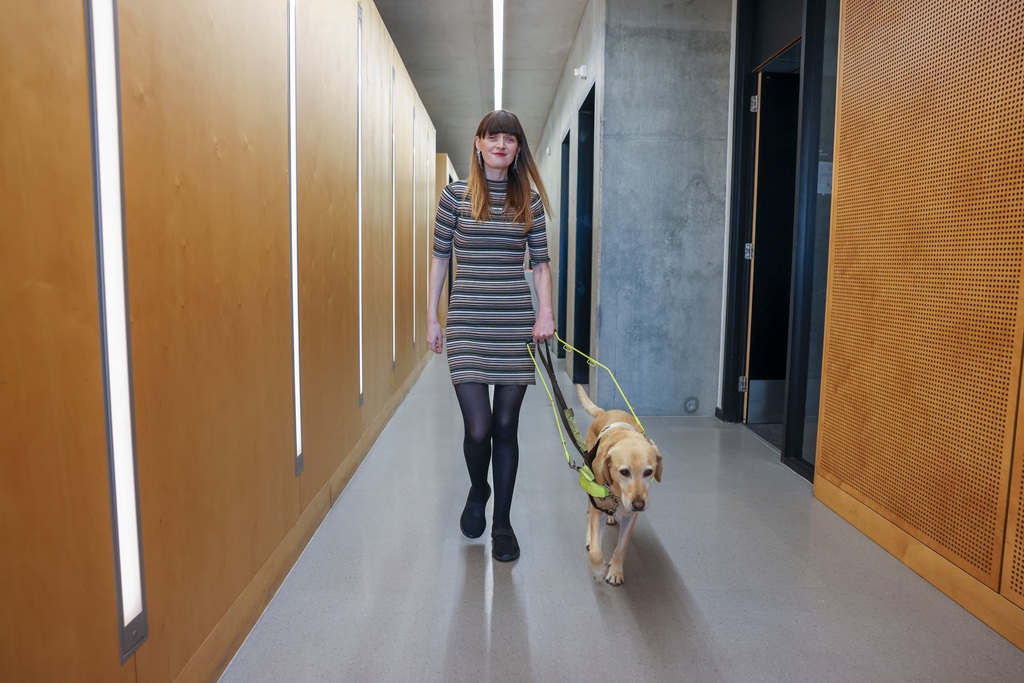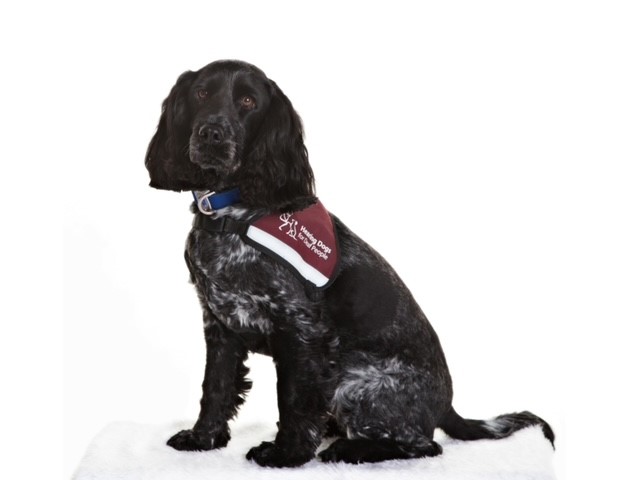Hearing dogs for people who are deafblind

Hearings dogs help people who are deafblind be more independent and get important information about their surroundings.
This page covers key information about what hearing dogs do for people with hearing loss, taking your hearing dog to public spaces, and how they’re protected by the law.
What is a hearing dog?
A hearing dog is a type of assistance dog for people with hearing loss. They’re trained to alert their partners to important sounds. They can also help with loneliness, improved confidence, and increased independence.
How do hearing dogs help people with hearing loss?
Hearing dogs alert their partners to important noises – such as a knock at the door and someone calling your name. They can also be lifesavers, alerting their partners to important sounds like fire alarms. Knowing that your hearing dog is there for you and will alert you to important sounds can be reassuring, and help you feel safer both at home and out and about.
If you’re feeling low or finding that your hearing loss is affecting your mental health, you might find a hearing dog gives you some comfort and support. Hearing dogs give their partners love, emotional support, and companionship. Living with hearing loss can be isolating, and being partnered with a hearing dog can make a real difference. They can help reduce anxiety, stress, and improve your confidence.
Hearing dogs can also protect you and your loved ones by alerting you to lifesaving or even potentially dangerous sounds, such as a baby crying or the sound of an injured child.
What breeds are hearing dogs?
Breeds of dog often used as hearing dogs include Labradors, Golden Retrievers, Poodles and Cocker Spaniels. These breeds are known for their trainability and good temperaments and make great hearing dogs.
A good hearing dog is alert, loves people, and enjoys having a job to do. They should also be naturally calm and confident because they’ll experience lots of busy, loud environments when they’re working.
How much does it cost to get a hearing dog?
If you have hearing loss, you can apply for a free hearing dog from a charity. You won’t have to pay for the dog, but you’ll normally need to complete an application and an assessment. If you’re successful, the charity may offer you a hearing dog.
It costs the charity about £25,000 to fully train a hearing dog from a puppy. The total lifetime cost for a hearing dog (which includes things like ongoing training, support, and vet care) is estimated at around £40,000 – £45,000. They’ll also cover the cost of veterinary care and food.
Do hearing dogs have to wear a vest?
Hearing dogs wear a burgundy vest when they’re out in public. The vest lets people know that the dog is working and that the person with it has hearing loss. It also signifies that the dog is trained, healthy and well behaved.
However, it’s not a legal requirement to wear the vest. It’s not required for any assistance dog to wear a vest or harness to identify it as an assistance dog. If someone challenges you about it and you want to reply, you could simply say that your dog is an assistance dog and is highly trained to support you. The dog doesn’t need a vest or harness to do its job and has a right to be there with or without one.
If you have sight and hearing loss, your assistance dog can wear a red and white checked harness.
Are hearing dogs protected by the law?
Yes, hearing dogs are protected by The Equality Act (2010). They have a legal right to be in public places, and service providers must make reasonable adjustments for them and their handlers.
It’s illegal for a service provider, such as a shop or restaurant, to refuse someone entry because of a disability or because of any equipment (such as a wheelchair, cane, hearing dog or assistance dog) they use as a result. It’s also against the law to harm, assault, harass or otherwise interfere with a hearing or assistance dog.
Your hearing dog has a legal right to be in public places, including restaurants, pubs, hotels, parks, taxis/minicabs, shops, planes, and public transport. Your place of work should also make reasonable adjustments for your hearing dog.
Hearing dogs for people who are deafblind
Angela is a Helpline Advisor here at Deafblind UK. Her hearing dog is a huge part of her life:
“My hearing dog, Gilby, has had a massive impact on my life. He is my ears and also my best friend. Without him, I would not feel safe – he’s amazing,” Angela said.
If you’re thinking about applying for a hearing dog, or just want to know more about what assistance is available, we can help. Contact us or call 01733 358 100 to talk to one of our friendly helpline team.
Let’s keep in touch!
Join our mailing list and we will keep you up to date about our projects and opportunities to get involved with Deafblind UK.
More Articles

How to prepare for a job interview when you have dual sensory loss
Preparing for an interview can feel daunting. There are nerves, anxiety, deciding what to wear, remembering what to say, and…

Bridging the employment gap for people with deafblindness
Together, we can help close the employment gap and ensure that people with dual sensory loss have every opportunity to...

Meet the creator behind the new Blind Naked Calendar!
Megan from our fundraising team chatted with Blind Naked Calendar creator, Josephine, to find out about her life as someone…

